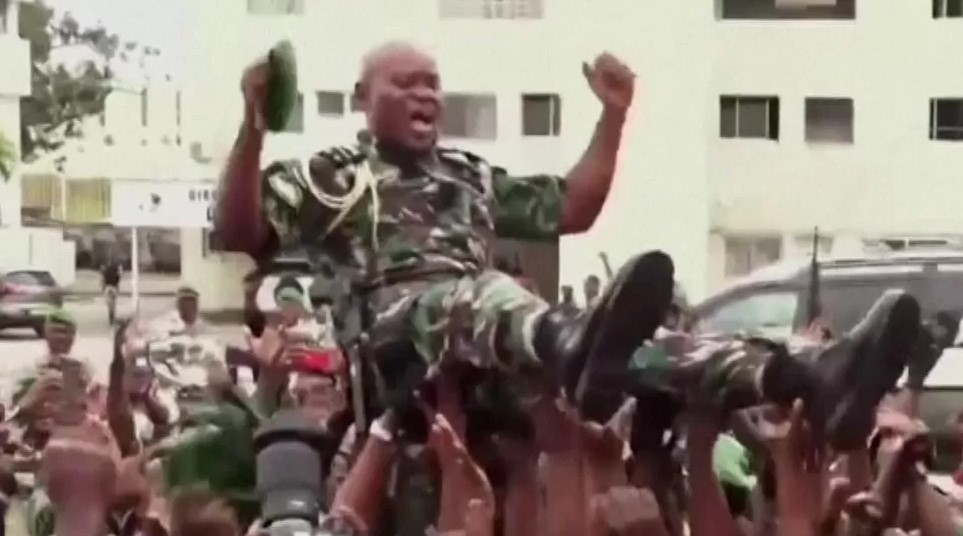General Brice Oligui Nguema has been appointed to the position of interim leader in Gabon after army officers staged a coup on Wednesday and seized power in the country.
Earlier, General Nguema was given a hero’s welcome by his troops as they paraded triumphantly through the streets of the capital city of Libreville.
Ali Bongo, the former President of Gabon, has been seen in a video that was filmed at his residence. In the video, he asks his “friends all over the world” to “make noise” on his behalf.
The country, which was formerly a French colony, is now one of the most important oil producers in Africa.
The pandemic of coups in Africa continues to expand.
The proliferation of military takeovers across Africa
Ali Bongo is the former playboy prince who is been placed under house arrest.
The ouster of Mr. Bongo brought an end to the 55-year reign of his family in power in the Central African state.
Army officers made their way onto television early on Wednesday morning to announce that they had taken control of the government.
They stated that they had overturned the results of the election that took place on Saturday, in which Mr. Bongo was declared the winner despite the opposition claiming that the election was rigged.
Additionally, the officers reported that they had detained one of Mr. Bongo’s sons on suspicion of treason.
Within a matter of hours, the generals gathered to decide who would oversee the transition, and they reached a consensus to pick General Nguema, who had previously served as the commander of the presidential guard.
In an interview with the French newspaper Le Monde, General Nguema stated that the people of Gabon had had enough of Ali Bongo’s dictatorship and that the president should not have sought for a third term in office.
“Everyone talks about this, but nobody takes responsibility,” he added. “Everyone talks about this, but nobody takes responsibility.” “As a result, the army made the decision to turn the page.”
Celebrations were held all around the country, including in the capital city of Libreville.
However, the United Nations, the African Union, and France, which had close relations to the Bongo family, all voiced their opposition to the coup.
The United States Department of State asked Gabon’s military to “preserve civilian rule” and urged “those responsible to release and ensure the safety of members of government” The United Kingdom voiced its disapproval of what it called a “unconstitutional military takeover” of power.
There has been a long-simmering animosity of the Bongo family because they dominated Gabon for almost 56 years, and there has been popular unhappiness about broader issues such as the cost of living. Both of these things have contributed to the current political climate.
“At first, I was scared, but then I felt joy,” a local of Libreville who asked the BBC not to reveal their identity said. “I was scared because of the realization that I am living through a coup, but the joy is because we’ve been waiting for so long for this regime to be overthrown,” she said. “We’ve been waiting for so long for this regime to be overthrown.”
The fundamentals of the coup in Gabon
Where can you find Gabon? With a population of only 2.4 million people, it is a country that is located on the west coast of Central Africa and is abundant in oil and minerals.
Who exactly is this Ali Bongo? The results of Saturday’s contentious elections were announced, and he has served as president continuously since 2009. Prior to it, his father had held the position of power for the previous 41 years.
Why did there end up being a coup? The military leadership refuses to acknowledge the results of the election and claims they usurped power in order to maintain order.
Continue reading for an explanation of the recent coup in Gabon.
Gen. Nguema, who is 48 years old, was not present when the first three statements announcing the coup were read out on national television by top army leaders.
But shortly after that, he was given the position of interim leader, and there were scenes of jubilation as he was carried through the streets.
His father, Omar Bongo, who controlled the country for almost 42 years until his death in 2009, appointed him as an aide-de-camp.
An ex-colleague who was very close to Gen. Nguema informed the AFP news agency that the two men were incredibly close, and that Gen. Nguema had served Omar Bongo from 2005 until the latter’s death in a hospital in Spain.
During Ali Bongo’s rule, he began his career in the Gabonese government serving as a military attache in the country’s embassies in Morocco and Senegal.
However, in 2018, he was given the position of intelligence chief under the elite Republican Guard, which is Gabon’s most powerful army unit. In this role, he succeeded Ali Bongo’s half-brother Frederic Bongo, and this was followed by a promotion to the rank of general.
The method of voting on Saturday in Gabon’s general election raised significant concerns, as it had in the country’s previous general elections.
Albert Ondo Ossa, the leading candidate of the opposition, lodged a complaint that many polling stations did not have ballot papers containing his name. At the same time, the coalition that he represented stated that the names of some of those who had withdrew from the contest for the presidency had still remained on the vote sheet.
Both of Mr. Bongo’s prior victories have been called into question due to allegations of fraud by his competitors. This time, contentious alterations were made to voting papers in the weeks leading up to election day.
In 2018, he had a stroke, which rendered him unable to work for about a year and led to calls for him to stand down from his position.
The following year witnessed another failed attempt at a coup, which resulted in the imprisonment of mutinous soldiers.




